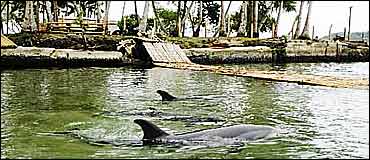Special Action Alert - Solomon Islands
| Home > Action Alerts > Solomon Islands Dolphin Trade | SITEMAP |
STOP the Illegal Trade in Dolphins
Foreign businessmen are taking advantage of poverty and civil strife to rob the people of the Solomon Islands of one of their most precious living resources. Under the guise of building an ecotourism operation, a Canadian businessman has been paying local fishermen as little as $260 each to collect dolphins from the wild. The 200 dolphins collected so far are confined in tiny pens, waiting to be auctioned off to the highest bidder. The Parque Nizuc water park in Cancun, Mexico has bought the first 28 of the dolphins and plans to use them in a "swim-with- dolphins" attraction in the park. Despite protests in both the Solomon Islands and Mexico, and a formal request to stop the trade from the Australian government, Mexican authorities have issued a permit to allow the dolphins to be imported even though Mexico prohibits the capture of dolphins in its own waters! This trade violates international law, and puts wildlife in both the Solomon Islands and Mexico at risk. You can help by urging Mexico to revoke the import permit for these dolphins and return them to the wild, where they belong.
Outrage over dolphins-for-dollarsDozens of wild dolphins have been caught in the strife-torn Solomon Islands and are being held in makeshift pens as part of a scheme by a foreign syndicate to sell them around the world. For several weeks, Solomons villagers have been capturing dolphins and taking them to the holding pens in exchange for a rumoured $400 cash. Many of the marine mammals have been transported for hours in open boats and one of the dolphins - being trained to perform tricks to show potential buyers - was recently killed by a crocodile. Nearly 60 dolphins are captive on the island of Gela off the capital, Honiara. Locals say they have seen dozens more at other locations. In Australian territorial waters, the catching of dolphins is illegal and there has been a crackdown on such operations in other parts of the Pacific, including in Vanuatu.
In the Solomon Islands, the legal position in relation to catching dolphins is unclear. Internal chaos has allowed foreign companies to set up damaging commercial logging and fishing operations without proper monitoring or export controls. The hunting of dolphins is likely to add to the divisions caused by this exploitation. The rumour in Honiara is that the foreign organisers intend to train the dolphins overseas and then return them to the Solomon Islands. But Mr Jionisi said yesterday that the tourism industry was now virtually non-existent and he did not believe any dolphins would be returned. Mr Jionisi said villagers working for the foreign operators had said privately that the plan was to export the collected dolphins for sale overseas. Dolphin teeth are a highly regarded part of traditional bride price ceremonies on the island of Malaita, where most of the dolphins are being caught. In some other parts of the Solomon Islands, it is taboo to harm the animals in any way, partly because of an ancient belief that people with magical powers could turn themselves into dolphins. Mick McIntyre, the Sydney-based Asia-Pacific director of the International Fund for Animal Welfare, said yesterday that the scheme operating in the Solomon Islands was a matter for great regret. He described the operation as an insult to the special status of dolphins in Solomons culture. Greenpeace's representative in Honiara, Geoffrey Dennis, said another concern was the environmental damage caused by using dynamite to catch large numbers of fish to feed the penned dolphins. By Craig Skehan - 7 July, 2003 Copyright © 2003 The Age Company Ltd Back to MENUWhales in Danger Information Service |


